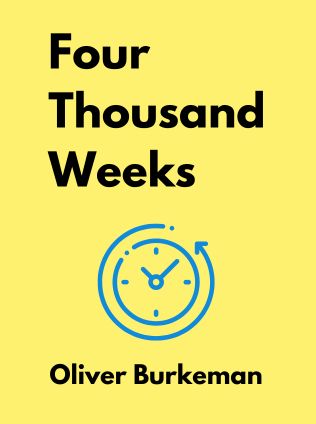
Four Thousand Weeks
Time Management for Mortals
By Oliver Burkeman
Published 06/2023
About the Author
Oliver Burkeman is a British journalist and author known for his insightful and often contrarian perspectives on happiness, productivity, and time management. He has written for various prominent publications, including The Guardian, where his column "This Column Will Change Your Life" gained a dedicated readership. Burkeman’s work frequently explores the philosophical and psychological underpinnings of how we live our lives, making complex ideas accessible and engaging for a broad audience. His book, Four Thousand Weeks: Time Management for Mortals, encapsulates his deep dive into the human experience of time and offers a transformative perspective on how we might better manage it.
Main Idea
In Four Thousand Weeks: Time Management for Mortals, Oliver Burkeman challenges conventional approaches to time management and productivity. Rather than offering techniques to cram more tasks into our finite hours, Burkeman urges readers to embrace the limitations of human existence. The book's core message is that true peace and fulfillment come not from maximizing efficiency but from accepting our mortality and choosing to focus on what truly matters. He argues that the modern obsession with productivity often leads to a never-ending cycle of tasks, leaving people perpetually overwhelmed. Instead, Burkeman promotes a philosophical and psychological reorientation towards time, encouraging a focus on meaningful activities and the acceptance of life's inherent limitations.
Table of Contents
- Choosing to Choose
- Facing Mortality
- Distraction and Attention
- Beyond Control
- Instrumental Time and Leisure
- Impatience and Patience
- Embracing Community Rhythms
- The Freedom of Insignificance
Choosing to Choose
In his first section, Burkeman explains that “the real problem isn’t our limited time. The real problem… is that we’ve unwittingly inherited, and feel pressures to live by, a troublesome set of ideas about how to use our limited time.” He discusses how people in medieval England viewed time differently, not as an entity but as an organic part of life. This perspective, he argues, is lost in modern society, where time is often seen as a resource to be managed and optimized.
"The trouble with attempting to master your time, it turns out, is that time ends up mastering you." - Oliver Burkeman
Burkeman emphasizes the importance of accepting our limitations and making conscious choices about how we spend our time. Every decision to engage in one activity necessarily means forgoing countless others. This acceptance, he argues, can lead to a greater sense of freedom and purpose.
He explains that in medieval times, farmers lived a life where “the rhythms of life emerge organically from the tasks themselves.” This natural flow of tasks was not about managing time but about living within it. In contrast, the invention of clocks and the abstraction of time into measurable units changed how people viewed and used it. This shift led to the modern pressure to optimize and control time, creating a constant sense of urgency and the never-ending quest for productivity.
Burkeman argues that this relentless pursuit of productivity is counterproductive. He states, “the more tasks a person attempts to fit into their day, the more tasks will arise.” The key, he suggests, is to focus on what truly matters, making deliberate choices about where to direct our limited time and energy. By acknowledging our limitations and embracing the fact that we cannot do everything, we can find greater peace and satisfaction in our daily lives.
Facing Mortality
Burkeman delves into the different relationship with time people have when they confront their mortality. He illustrates this with a personal example of a ski trip with his family, noting that its value comes partly from the awareness that these moments are finite. He suggests that acknowledging our limited time on Earth can imbue our lives with more meaning.
"If you’re procrastinating on something because you’re worried you won’t do a good enough job, you can relax - because judged by the flawless standards of your imagination, you definitely won’t do a good enough job. So you might as well make a start." - Oliver Burkeman
Burkeman argues that instead of striving to get everything done, we should focus on what is truly important. This involves embracing our limitations and understanding that we cannot accomplish everything, no matter how efficient we become. He believes that this shift in perspective is crucial for finding peace and fulfillment in our lives.
He also discusses the concept of “procrastination” in a new light. According to Burkeman, we are always procrastinating on something because we have to make choices about how to spend our limited time. He suggests that instead of seeing procrastination as a failure, we should view it as an inherent part of life. By accepting this, we can focus on what truly matters and let go of the guilt associated with not being able to do everything.
Sign up for FREE and get access to 1,400+ books summaries.
You May Also Like
The Subtle Art of Not Giving a F*ck
A Counterintuitive Approach to Living a Good Life
By Mark MansonRich Dad Poor Dad
What the Rich Teach Their Kids About Money - That the Poor and Middle Class Do Not!
By Robert T. KiyosakiHow To Win Friends and Influence People
The All-Time Classic Manual Of People Skills
By Dale CarnegieQuiet: The Power of Introverts
The Power of Introverts in a World That Can't Stop Talking
By Susan Cain



















